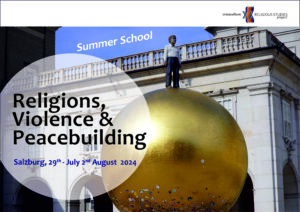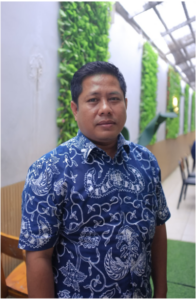SummerSchool 29.07.2024 – 02.08.2024
Religion, Violence and Peacebuilding
at the Paris-Lodron University Salzburg.
In many places around the world, religions are once again being associated with violence. Religious ideas and ideologies play a direct or indirect role. At the same time, religions claim to bring peace. The SummerSchool examines the relationship between religion and violence and explores their potential for peacemaking. Experts from different specialist perspectives and religious backgrounds – such as Judaism, Islam, Christianity, Buddhism, Jainism and others – will offer a series of lectures. A peace-building workshop, the opportunity for student papers and plenty of space for intensive exchange also characterise the programme. A rich cultural programme rounds off the summer school.
Program
Monday 29.07.2024
09:00 Arrival
10:30 Registration, Welcome and Introduction in HS 103 by Martin Rötting
11:00 Lecture 1: Dr. Martina Fischer: Two sides of the coin: The transformative and destructive potential of religion and faith-based actors in conflict
12:00 Lunch
14:00 Lecture 2: Wamae W. Muriuki: Buddhist Resistance to State Violence: The Case of Wartime Japan
16.00 Lecture 3: Soonil Hwang: Buddhist Ways of Dealing with Conflict
17:00 Debate Moderation Martin Rötting
19:30 Student party (Yard of the Faculty of Catholic Theology)
Tuesday 30.07.2024
9:00 Lecture 4: Grace Darling: Local conflicts in India
10:30 Group work
12:00 Lunch
14:30 Lecture 5: J.H. (Yossi) Chajes: The Overcoming of Biblically-Mandated Violence in Rabbinic Jewish Tradition in HS 101 in cooperation with https://www.salzburger-hochschulwochen.at/&ts=1712054021039
15:10 Lecture 6: Iqbal Ahnaf: Siege mentality and extremism in HS 101 in cooperation with https://www.salzburger-hochschulwochen.at/&ts=1712054021039
16.00 Coffee Break
16:30 Reflection
18:00 Supper
20:00 concert in the local residence or free evening
Wednesday 31.07.2024
9:00 Lecture 7: Edith Kayeli Chamwama: Case studies of peace building processes in Africa
10:30 student papers in HS 103:
10:30 Tabea Schünemann: Sunni Imam Muhammad Abu Zeid from Sidon, Lebanon
11:00 Denise Polaczuk: Religious Nationalism in the post cold war era – and today
11:30 Astrid Syifa Salsabila: “Romo Sandjaja, Doakanlah Kami”: Analysing the Relationship between Catholic and Muslim in Muntilan
through the Discourse of Father Richardus Sandjaja
10:30 student papers in HS 109
10:30 Gichane Lucy: Wanjiku, A Still soft Voice. Silence of Femicide.
11:00 Felix Johne: On the relevance of transcendent concepts of reality in social work with addicts
11:30 Regula Hoch: Enemy becomes human. Israel/Palestine peace movements.
12:00 Lunch
14:00 Cultural Outing: Museum of Modern Art Salzburg: Breaking down Walls
19:30 Evening: Award Ceremony (in German) or free evening
Thursday 01.08.2024
9:00 Lecture 8: Fatimah Husein: Is interreligious dialogue effective for peacebuilding?
10:30 student papers in HS 103
10:30 Melli Fersi: Interreligious Learning Spaces
11:00 Alexandra Morath: Why religious pluralism is the basis for productive interreligious dialogue
11:30 Miriam Wambui: Kūhorohia: An Indigenous Model of Conflict Resolution and Reconciliation among the Agìkūyū in Kenya.
10:30 student papers in HS 109
10:30 Alina Knoflach: The individual significance of implicit religiosity for refugee migrants’
11:00 Jobins Antony: Dialogue of Life – A model for Co-Existence – context of India
11:30 Kalladayil Varkey Joseph: The Syro-Malabar Church and its Ecumenical Relations with other Christian denominations in Kerala
12:00 Lunch
14:00 Orinta Z. Rötting: workshop peacebuilding
17:00 Ulrich Winkler Award (UWA): Lukas Wiesenhutter: Job’s Encounter. Islamic and Christian Perspectives on Theodicy and Theodicy Sensitivity.
18:30 Evening: Sommerempfang Bischofsresidenz “Bishop + Tod”
Friday 02.08.2024
09:00 group work reflection
10:30 group work presentation and conclusion
12:00 Lunch
14:00 Departure
More information about the lectures:
Lecture 1: „Two sides of the coin: The transformative and destructive potential of religion and faith-based actors in conflict” by Dr. Martina Fischer, Policy Advisor for the protestant development agency “Brot für die Welt”
Faith-based actors are involved in many conflict zones around the globe. They have a potential for bringing antagonists at the negotiation table, and may support peace processes and reconciliation. However, faith-based actors may also contribute to violent escalation, by forging coalitions with politicians who instrumentalise religious diversity in hate speech and war propaganda. What is needed for enhancing constructive approaches? Is interreligious dialogue a remedy, and where are potentials and limits? What does reconciliation mean in different religious settings, and which preconditions are necessary?
Lecture 2: “Buddhist Resistance to State Violence: The Case of Wartime Japan” by Wamae W. Muriuki, University of Nairobi
While many Buddhist religious groups were coopted into Japan’s wartime militarism, as has been (in)famously documented in the case of Zen Buddhism, Japanese Shin Buddhists represented a small yet vocal locus of resistance to state propaganda. This presentation will document how this peace oriented stance was grounded in both deep religious commitment, and compassionate concern for all the communities bound up by Japanese state violence.
Lecture 3: Buddhist Ways of Dealing with Conflict by Soonil Hwang, Dongguk University Seoul
How does Buddhism approach conflict resolution? Are there specific methods within Buddhism for mitigating conflict? Fundamentally, Buddhism stands in opposition to conflict, violence, and killing under any circumstance. The teachings assert that engaging in violence or killing, regardless of one’s status, inevitably leads to dire consequences. Yet, our world is rife with innumerable and perpetual conflicts, almost as if violence were ingrained within human nature as a means of resolving disputes. In this presentation, I delve into various narratives within the life story of the Buddha, both past and present, to scrutinize his attempts at conflict resolution.
At times, the Buddha actively intervened in conflicts, striving to quell them, while in other instances, he found himself powerless to intercede, merely bearing witness to the unfolding violence. It appears that even the Buddha’s efforts had their limitations, ultimately leading to an acceptance of the world’s inherently conflict-ridden and violent nature. Through an analysis of diverse Buddhist tales, I explore the intricate Buddhist methodology for dealing with conflict, drawing insights from both the successes and limitations encountered by the Buddha and his disciples.
Lecture 4: Local conflicts in India by Grace Darling, Banaras Hindu University Varanasi
India being a country of diversity, witnessed so many events: pleasant as well as unpleasant events in the name of race, language and religions. One fierceful conflicts was the ethnic conflicts between the Nagas Indigenous people and the Kukis in the 1990s. Many were killed and displaced but there was a conflict resolution and peace was built through the initiatives of the Churches-the common ground they found. Forgiving bitterness, people are friends again and also worshipping God together again. But conflict resolution seems to be a more difficult task when it happens between entirely two different communities with lesser strong common ground like the present fierce conflicts in Manipur India between the Meiteis and the Kukis ethnic Community. With the even ever increasing advanced arms and ammunitions and with great loss of lives and property continuing on both the sides and uncertain future, there is a greater need for research for peacebuilding to be practical.
Lecture 5: The Overcoming of Biblically Mandated Violence in the Jewish Tradition by J.H. (Yossi) Chajes, University of Haifa, in HS 107
The Jewish tradition — technically speaking, the rabbinic tradition that establishes what is called “Judaism” and which is known in emic terms as “the Oral Tradition” — might be described as a courageous and even audacious attempt of the ancient rabbis to read and implement the Bible in a manner consistent with their own ethical ideals. This, even when doing so required them to assert readings that clearly contradicted the plain sense of Scripture. In this session we will explore the ways in which rabbinic morality and commitment to the sanctity of human life led to the neutralization of biblical justification of holy wars and their concomitant genocides.
Lecture 6: Siege mentality and extremism: challenges and paths in religious peacebuildin by Mohammad Iqbal Ahnaf, Gadjah Mada University Yogyakarta, in HS 107
Some years ago, coming from the majority Muslim region of Java, I met a woman pastor in a Christian majority community of Indonesia’s peripheral region of East Nusa Tenggara. The pastor was one of prominent local advocates of inter religious tolerance in Christian majority regions of Indonesia. I was moved by her worry of what she called ‘intensifying diversity.” Her fear reflects a pressing issue of siege mentality that shapes views and attitudes toward religious others. Migration that brought more diversity has reached more rural communities and often caught them unprepared for multidimensional impacts of demographic changes. Siege mentality finds reference in religious narratives that can develop into extremist minds when they manifest in histories and socio-psychological realities of individuals living in diverse communities. Based on my peacebuilding experience in Indonesia, this presentation will highlight this challenge and offer paths for peacebuilding in multi-religious religious community.
Lecture 7: Case studies of peace building processes in Africa by Edith Kayel Chamwama, University of Nairobi
History is replete with conflicts that have taken place on the African continent. The causes and effects of these conflicts have ranged from personal to communal, ethnic to national, intra to inter-state, and religious to political among many others. Within all these conflicts, the desired outcome has always been peace and reconciliation. As a result, there have been various attempts and strategies to bring about peace and reconciliation. It is against this backdrop that we will discuss the peace-building process in Africa. Recognizing the complexity of this topic and not trying to make a generalization, this discussion offers a glimpse of the peace-building process in Africa by presenting case studies selected from various sections of the continent. This discussion is predicated on the concept that peacebuilding encompasses a spectrum of policies designed to lower the risks of slipping into conflict, providing the foundation for enduring peace and development, and enhancing national capacity. These policies are converted into strategies that lead to achieving the desired peace and reconciliation. The resultant strategies are tailored to specific country or context needs, which is why we use case studies in this discussion. The case studies attempt to highlight the factors driving the conflicts and the strategies that have been employed in the peace-building process. Data for this discussion will be gathered from secondary sources.
Lecture 8: Is interreligious dialogue effective for peacebuilding? by Fatimah Husein, Gadjah Mada University Yogyakarta
Interreligious dialogue has often been claimed as a method in preventing or overcoming conflicts involving people of different religious and faith backgrounds. Some argued that the international community has only two choices: dialogue or death (Knitter, et. al, 1991). This could be strengthened with the findings from the Society for the Study of Conflict, which, in 2015, reported that victims of religious-based conflict or conflict instigated by religious related issues in 2011 – 2013 are higher than the total number of World War I and II combined.
The question is: “Is religion killing us? Is there any hope for the future of interreligious relationships? And, is interreligious dialogue effective for peacebuilding?” This session will discuss those questions with particular examples and cases from Indonesia, which, being the biggest Muslim country in the world, has more than 35 millions adherents of faiths and religions other than Islam.
Ulrich Winkler Award: Lukas Wiesenhutter: Job’s Encounter. Islamic and Christian Perspectives on Theodicy and Theodicy Sensitivity.
Text coming soon
Speakers
Prof. Dr. Martin Rötting
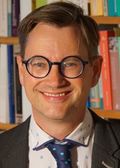
Picture: Orinta Z. Rötting
- Associate Professor of Religious Studies and Head of the Religious Studies programme at the Center for Intercultural Theology and Study of Religions at Paris-Lodron University, Salzburg.
- Education:
1990-1994. Studies in Religious Education at Catholic University Eichstätt
1999-2001. Studies in ecumenism at Trinity College Dublin, MA of Ecumenic Studies
2002-2007. Doctorate (Dr. phil.) in Religious Studies at the Ludwig- Maximilians-University Munich
2013-2018. Habilitation in Religious Studies at the LMU Munich - Research fields: Interreligious Learning, Present forms of Religion and Spirituality, Buddhist-Christian Dialogue, Contemporary forms of Buddhism, Multifaith Spaces.
Dr. Martina Fischer
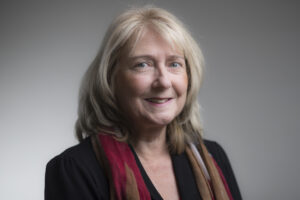
Political Scientist, *1958. Since 35 years she worked in peace and conflict research, at the Institute for Peace Research and Security Policy at Hamburg University (1988-89), at the Berghof Foundation (1997-2016, as Deputy Director of the Research Center and Director of the Southeast-Europe-Program; Co-founder and Co-editor of the “Berghof Handbook for Conflict Transformation“). Since 2016 she works as a Policy Advisor for the protestant development agency “Brot für die Welt” in Berlin.
Dr. Wamae Muriuki
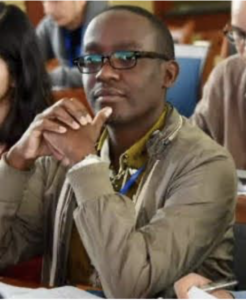
Dr. Wamae Muriuki is a lecturer in the Department of Philosphy and Religious Studies. He graduated with a PhD in Comparative Studies of Religion from the Ohio State University in 2012. His area of specialization is in Japanese Buddhism, particularly Japanese True Pure Land Buddhism, or Jodo Shinshu, on which he wrote his PhD dissertation. At the University of Nairobi, he teaches courses on Comparative Religion, Interfaith Relations, and specialised courses on Hindu and Buddhist thought. His current research interests focus on Kenyan converts to Hinduism and Buddhism, and their contested relationship to the dominant religious paradigm.
Dr. D.Phil Soonil Hwang
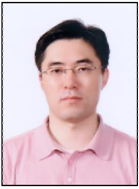
- Associate Professor in the College of Buddhist Studies and also Dean of the College of Buddhism in Dongguk University in Seoul, South Korea.
- His main field of research is the doctrinal history of Early Buddhism and Buddhist culture in South and Southeast Asia.
- Education:
1985-1987 Hekwang High School, Pusan
1987-1993 Dept. of Indian Philosophy, Dongguk Univ. Seoul
1993 B.A. in Indian Philosophy
1993-1995 Graduate School, Dept. of Indian Philosophy, Dongguk Univ. Seoul
1995 M.A. in Early Indian Buddhism
1996-2002 Dept. of Oriental Studies, Oxford University
2003 D.Phil. Oxford University
- Courses: Early & sectarian Buddhism
Prof. Dr. Grace Darling
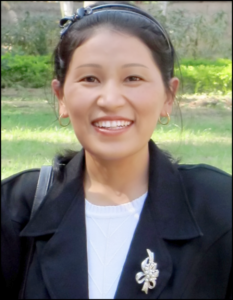
Associate Professor, Department of Philosophy & Religion, Banaras Hindu University,
MA in Philosophy from North-Eastern Hill University, Shillong (NEHU), M.Phil in Philosophy from North-Eastern Hill University, Shillong, Topic of Dissertation: Ludwig Feuerbach on Religion: A Critique, Ph.D in Philosophy from North-Eastern Hill University, Shillong, Topic: Zeliangrong Culture and Religion: A Philosophical Study, Post-Doc Research Exposure from University of North Texas (UNT), USA, Area of Research: Environmental Philosophy
Prof. Dr. J.H. (Yossi) Chajes

J. H. (Yossi) Chajes (Ph.D., Yale University 1999) is the Sir Isaac Wolfson Professor of Jewish Thought at the University of Haifa. Chajes’s research focuses on the intersection of Kabbalah, magic, and science in Jewish cultural history. He has written on spirit possession and exorcism, egodocuments, women’s religiosity, Jewish attitudes towards magic, and the visualization of knowledge. Chajes’s first book, Between Worlds: Dybbuks, Exorcists, and Early Modern Judaism (2003) was listed by the Wall Street Journal as among the top five books ever written on spirit possession, alongside Aldous Huxley’s The Devils of Loudun. His recently published The Kabbalistic Tree was awarded the 2023 Jordan Schnitzer Book Award for best book in the category of philosophy and Jewish thought; Library Journal lauded it as “a monumental achievement that will be valuable to scholars and general readers interested in Judaism, religion, and art history.” Chajes’s pioneering work has been awarded five Israel Science Foundation (ISF) grants, the Friedenberg Prize for the outstanding project in the humanities, and two Volkswagen Foundation grants to develop the digital humanities project “Maps of God – The Visual Kabbalah Portal (ilanot.org).”
In Kooperation with: ![]()
Prof. Dr. Mohammad Iqbal Ahnaf
Mohammad Iqbal Ahnaf is an assistant professor in sociology of religion at a post graduate program on religious and cross cultural studies, Gadjah Mada University, Indonesia. He teaches a course on “religion, violence and peacebuilding.” Dr. Ahnaf earned Ph.D in strategic studies (Victoria University of Wellington, New Zealand) and Master degrees in conflict transformation (Eastern Mennonite University, USA) and comparative religion (Gadjah Mada University). He has worked with various government agencies, NGOs and local communities promoting freedom of religion and belief, community resilience to extremism and peacebuilding in post-conflict societies in Indonesia. He has published books, journal papers and essays in various national and international publishers, including among others “The Image of the Enemy: Radical Discourse on Indonesia” (2006).
In Kooperation with: 
Prof. Dr. Edith Kayeli Chamwama
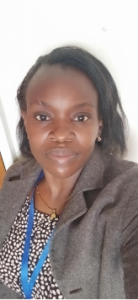
- Edith Kayeli Chamwamas specialty is in African Religion and African Christianity.
- She is a member of various professional bodies that include the The Circle of Concerned African Women Theologians (CCAWT), African Association of the Study of Religion (AASR). She is involved in various research projects that contribute to her academic work and growth. Her research interests are in African Religion and its intersection with the contemporary Issues affecting the people of Africa ranging from Christianity, Ecology, Development and Health among other issues.
- Education: Assistant Director in charge of Publications at the Maryknoll Institute of African Studies
- 2014 started working at University of Nairobi
Prof. Dr. Fatimah Husein

- Fatimah Husein is an Associate Professor at the Sunan Kalijaga State Islamic University Yogyakarta and at the Center for Religious and Cross-cultural Studies, Gadjah Mada University. She is currently the Associate Director of the Indonesian Consortium for Religious Studies (ICRS Yogyakarta), which is a consortium of three universities: Sunan Kalijaga State Islamic University, Gadjah Mada University, and Duta Wacana Christian University.
- Her current teaching and research areas include Inter-religious Dialogue, Philosophy of Religion, and Islam and Social Media. Together with Martin Slama, Eva F. Nisa, and Johann Heiss she received funding from the Austrian Science Fund for a three-year research project entitled “Islamic (Inter)Faces of the Internet: Emerging Socialities and Forms of Piety in Indonesia” (2014-2017).
- Education:
- Master degree in Islamic Philosophy from McGill University (Montreal, Canada)
- PhD in Indonesian/Islamic Studies from The University of Melbourne
Mag. theol. Anna Magdalena Hoffmann MA
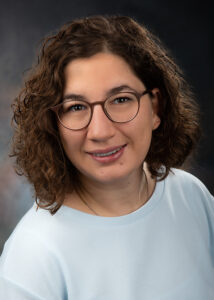
- Assistant Project Manager of the Crossculture Religious Project and SummerSchool since 2021
- Climate protection manager since 2021 and Project manager at a renewable energy company since 2022
- Education:2012-2015. Leopod-Franzens University Innsbruck. Catholic Theology 2015-2016. Erasmus Year at Heythrop College London attending Lectures in MA Psychology of Religion and MA Abrahmitic Religions 2016-2019. Paris Lodron University Salzburg. Mag. theol. Catholic Theology 2019-2023. Paris Lodron University Salzburg. MA Religious Studies 2021. Qualification for a Non-medical practitioner for psychotherapy 2022. Qualification for Climate Protection Manager
Conditions for attending our SummerSchool:
For the SummerSchool attendants you need to register
- For the SummerSchool academic program REGISTER HERE. Information: anna.hHT3DMoffmanjBlEQn@pln0OPius.ac.7pWc9at LXfFH
- For the Salzburger Hochschulwochen, in which this SummerSchool is a part of, for housing, meals, cultural program and the program of the Salzburger Hochschulwochen. (REGISTER for people under 30: COMING SOON!), first registration of the SummerSchool will be served first)
For help please ask anna.evbak.hofXH1qsdfmannMwnSy_@plu4moPVjs.acGFYXH1.atsdtNJC
Important notes:
- ROOM: If you have a private room in Salzburg and do not need to book a room, book the „Wochenkarte“ only.
- HELP & Information:If you have troubles in booking the Hochschulwochen, turn to annaAZs.hobj3ffmamMdnn@poLRlus.ac.ahDEt eVf for help.
- BOOKING: English website for the Hochschulwochen-Booking is in construction. If you want to save your space, send an Email to anna.8L@9bJThof5NwtiaAfmann@u0hQczjplus.akvgBnXKc.atkvgBnXK I1.qEpe
- LANGUAGES:The SummerSchool ist in English, the Hochschulwochen will be in German. There will be English translation for all participants of the SummerSchool.
Direction to the University of Salzburg?
Arrival at Salzburg main station:-> Take trolleybus line 1 to the stop “Herbert-von-Karajan-Platz“.-> On Herbert-von-Karajan-Platz turn northeast towards Universitätsplatz.-> Turn right onto Universitätsplatz– the university is on the right hand side.
Arrival Salzburg Airport-> Take trolleybus line 10 to the stop “Herbert von Karajan-Platz”.-> On Herbert-von-Karajan-Platz turn northeast towards Universitätsplatz.-> Turn right onto Universitätsplatz – the university is on the right hand side.
Arrival by car If you want to drive to Salzburg with a car, you can use the following link.
Parking: there aren’t any parking spaces right infront of the university but there are some parking houses close by – https://www.salzburg-altstadt.at/en/parking-in-salzburg
Apply for a student paper:
All students are allowed to hand in papers. The papers have to focus on problems of crosscultural relations and give a concrete field example. This can include academical, methodical, hermeneutical, philosophical, theological, or other relevant perspectives. Please send an abstract with 150 words to Prof. Martin Rötting (martin.r2BEu9GoetNWx031tingleoRg2@plus8leoRg.ac.atQ8leoR) till 01.05.2024.
Criteria to receive 3 ECTS:
In order to get 3 ECTS points you need to attend all lectures of the SummerSchool program, give a paper in the presentation slot and hand it in as an academic paper (10 pages, 12 New Times Roman, 1,5 space) to Prof. Martin Rötting (martimiMZn.r.T9AoettiUGjbng@plPetuus.ac.IhHqatKcks).
Contact and information:
Prof. Dr. Martin Rötting marzYMcKtin.roFumowettitTkiIng@pluG7g6Bs.aHJ.Aec.atl9SVx
Mag.a Anna Magdalena Hoffmann MA anna.aFA5l3MhofexnLEmPfmann@SaFA5l3plus.acT6uX7wc.at LEmP84C

